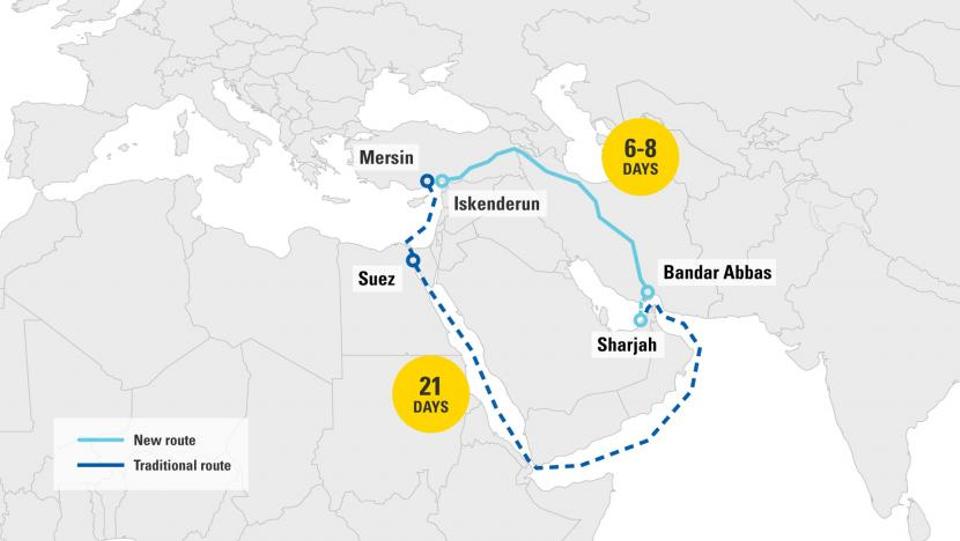The coronavirus pandemic affected the supply chain and caused a staggering increase in the container prices of maritime transportation. But the new Turkiye-UAE trade corridor is likely to be both time and cost effective.
The first shipment from the United Arab Emirates (UAE) to Turkiye, through Iran, has succeeded with an Emirati truck arriving in the Mediterranean port of Iskenderun in less than a week.
The new trade route between Turkiye and the UAE shortens the distance and time of shipments from both countries and vice versa to seven days instead of 21.
At the same time, Ankara and Islamabad have also signed an agreement for a similar route through Iran. This comes as part of Turkiye’s growing exports in the region as a key logistic hub in the Mediterranean.
Such promising projects reduce the cost of exports as well as the export time between Turkiye and UAE to six to eight days and for goods coming from Pakistan to 10-12 days only.
According to the project, Turkiye will benefit from the use of Bandar Abbas port in Iran as shipments arrive from UAE’s Sharjah to the Iranian port then start their journey within Transports Internationaux Routiers (TIR) to the Bazargan-Gurbulak border crossing between Iran and Turkiye. Travelling this route, the shipment only takes around a week.
TIR enables goods to transit from a country of origin to a country of destination in sealed load compartments that are controlled by customs via a multilateral, mutually recognised system.

Two-thirds of time saved
A pilot shipment has already succeeded travelling from Ras al Khaimah to Sharjah, then crossing the Arab Gulf to Bandar Abbas port on the Iranian side. The shipment was then directed to the Bazargan-Gurbulak border crossing, reaching Iskenderun on the Mediterranean in Turkiye. The entire journey of the shipment took less than a week.
The route could facilitate trade activity in the region, saving two-thirds of the time it takes for a shipment to follow the traditional maritime route via the Suez Canal.
The new route contributes to reducing the cost of exports and imports as a result of lower shipment and time costs.
In his last visit to the UAE, Turkiye's Foreign Minister Mevlut Cavusoglu said that cooperation is important for all, especially in trade and supply chain resources.
Cavusoglu highlighted that both countries are preparing for an agreement on land transportation which is expected to be signed next February when Turkiye’s President Recep Tayyip Erdogan visits Abu Dhabi.
Iran welcomed the project, which brings financial and geopolitical benefits as Tehran will profit from tariffs on trucks crossing its lands. Iran will have a tangible contribution to trade movement in the region, alleviating its isolation due to a years-long economic embargo.
Iran recently announced the completion of its international road toward the Turkish border, opening the door for similar projects to link Turkiye with the Arab Gulf countries through Iraq.
The new land road and other routes will have a regional effect on trade activity and verify the trade routes for Turkiye.
Rapprochement
For over a decade, the UAE and Turkiye have competedfor influence in the region. The growing economic, political, diplomatic, and military strengths of the two nations, combined with a fragile regional environment, fuelled the rivalry.
The rapprochement between both countries appears to be the result of the UAE’s economic interests and Turkiye’s desire to normalise relations in the region. Turkiye is an emerging - and lucrative - market for the UAE.
Moreover, with the lira's decline against foreign currencies, Turkiye is now an excellent place for foreign investments that will pay off in both the short and long terms.
Trade size
Investments from the UAE would boost the economy and help Turkiye evolve into an export powerhouse.
Trade and investments have notably grown between both countries, where the average yearly trade exchange reached approximately $8 billion. The UAE is considered to be one of the top Arab countries with a high volume of direct investments in Turkiye.
According to the Turkiye's Foreign Ministry data, trade exchange between the two countries reached $14.8 billion in 2017, $7.6 billion in 2018 and $7.4 billion in 2019.
The data indicates that the UAE is ranked 12th among importers of Turkish goods. The UAE is the second Arab importer after Iraq and the UAE is the ninth exporter to Turkish markets and the first Arab country.
Turkish exports to the UAE reached $3.5 billion in 2019 and Turkish imports from the UAE in the same year reached $4.33 billion.
The most important the UAE exports to Turkiye are gold, accessories, aluminium, fuel, mineral oils, chemicals and iron, while Turkiye exports pearls, precious stones, metals, electronic equipment and apparels to the UAE.
Social media is bold.
Social media is young.
Social media raises questions.
Social media is not satisfied with an answer.
Social media looks at the big picture.
Social media is interested in every detail.
social media is curious.
Social media is free.
Social media is irreplaceable.
But never irrelevant.
Social media is you.
(With input from news agency language)
If you like this story, share it with a friend!
We are a non-profit organization. Help us financially to keep our journalism free from government and corporate pressure













0 Comments